July 2025 Newsletter
Welcome to the July edition of Xylo Bio’s Neuroscience Newsletter. This month’s issue unpacks emerging evidence on combining psilocybin with SSRIs, highlights key results from clinical and preclinical studies in Research Updates, and shares the latest Xylo Bio Updates.
Science in Sixty Seconds
Do you need to stop antidepressants before taking psychedelics? Maybe not.
Clinical trials of psilocybin-assisted therapy have typically required participants who are on common antidepressants, like SSRIs or SNRIs, to discontinue these medications before treatment. This exclusion was rooted in two primary concerns:
Safety: the theoretical risk of serotonin syndrome or other adverse events from combining multiple serotonergic agents, as SSRIs increase synaptic serotonin by inhibiting its reuptake.
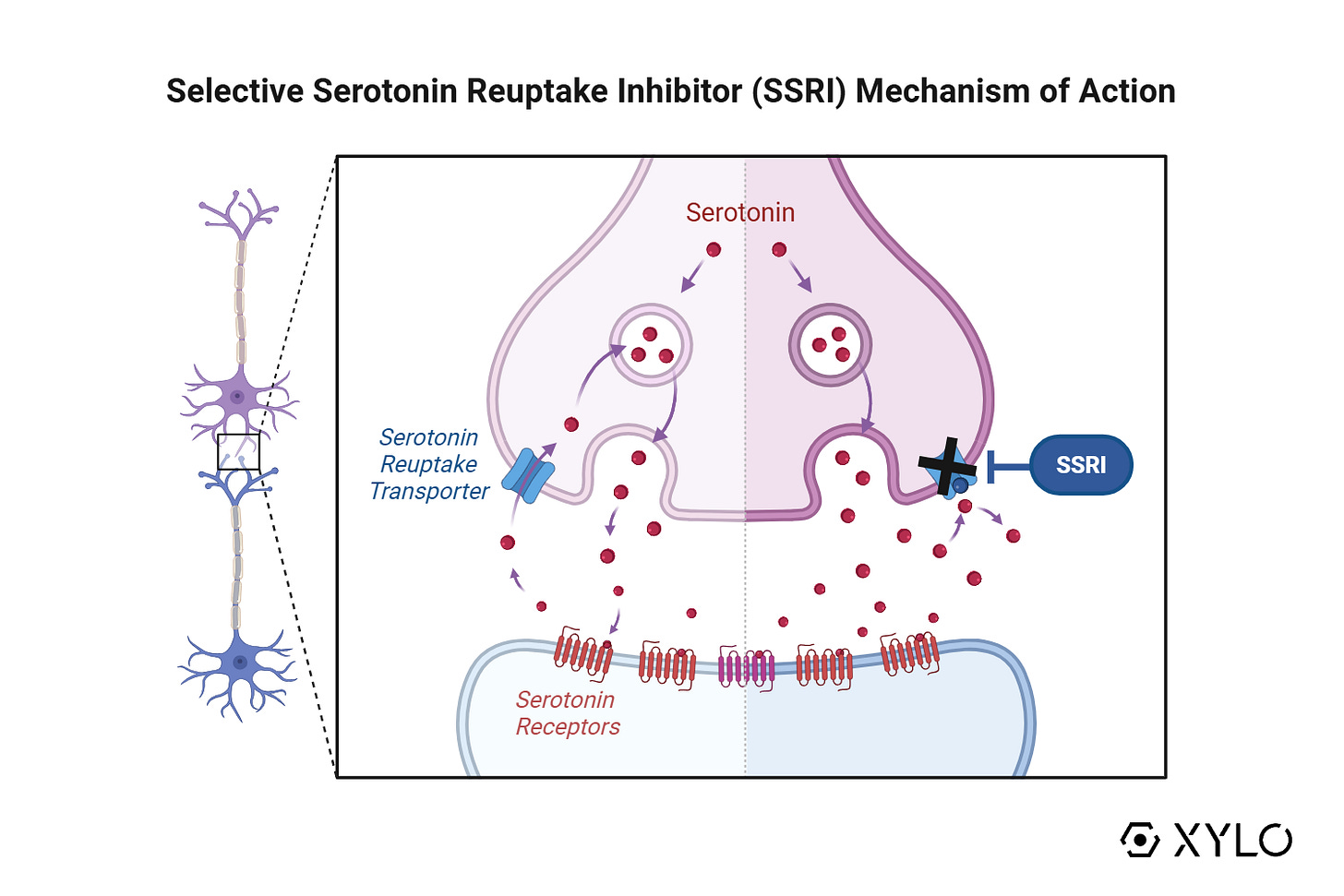
Efficacy: concern that SSRIs may diminish psilocybin’s effects by downregulating or desensitizing 5-HT2A receptors, the primary target of psilocybin’s psychedelic and therapeutic actions.
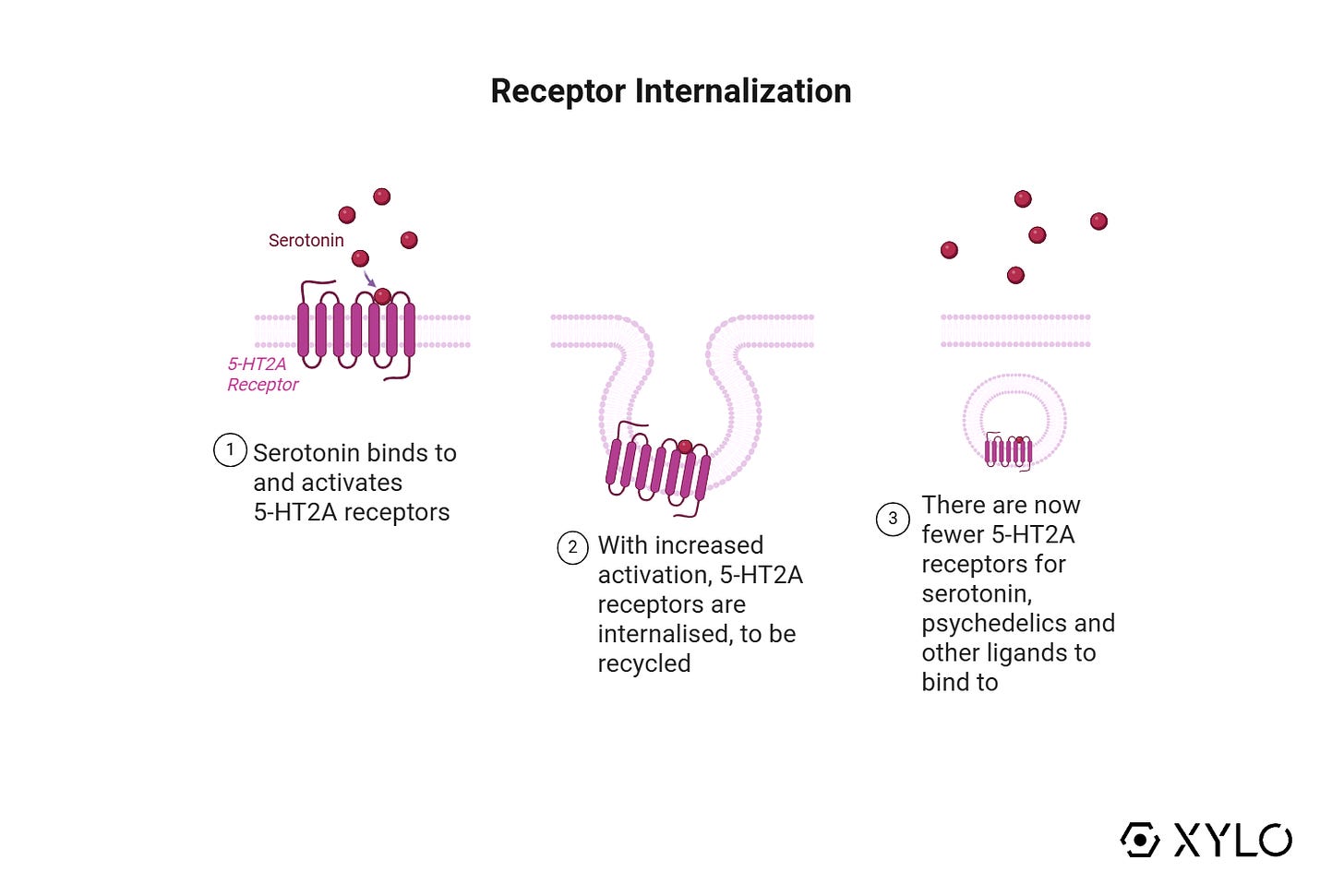
But these longstanding assumptions are being re-examined. A limited but growing body of evidence – including surveys, case reports, and clinical trials – suggests that psilocybin can be administered safely and effectively alongside antidepressants in some cases.
EVIDENCE
Observational and clinical data suggest that antidepressants may blunt the intensity of the psychedelic experience, but do not necessarily diminish therapeutic outcomes.
Observational data: Across three self-report studies – including retrospective and prospective surveys and a Reddit content analysis (Barbut Siva et al., 2024; Gukasyan et al., 2023; Sakai et al., 2024) – approximately half of the participants reported that antidepressants blunted the acute psychedelic experience, but improvements in depression and well-being were still reported. Serious adverse events were rare, and one study suggested that reduced effects may persist for months after discontinuation.
Clinical trials: Several recent clinical trials provide encouraging signals that psilocybin may remain safe and effective without discontinuing antidepressants:
- In a randomized, double-blind, feasibility trial for alcohol use disorder with comorbid depression (N=30), participants received two 25 mg psilocybin sessions (Luquiens et al., 2025). Among those in the psilocybin group, 55% continued SSRIs/SNRIs, and experienced slightly reduced psychedelic intensity but no difference in therapeutic outcomes.
- In an open-label, single-arm study, patients with treatment-resistant depression (N=19) remained on their SSRIs while receiving a 25 mg dose of psilocybin (COMP360) with psychological support (Goodwin et al., 2023). Antidepressant effects and safety outcomes were comparable to those observed in prior trials that required antidepressant discontinuation.
- A pilot trial in adults with fibromyalgia (N=10) allowed inclusion of participants on SSRIs, SNRIs, or low-dose bupropion (Aday et al., 2025). While no subgroup analysis was conducted, psilocybin was well tolerated across the group and associated with improvements in pain and function.
Secondary analyses of clinical data: Post-hoc analyses of double-blind clinical trials in depression offer mixed insights. Two studies (Chisamore et al., 2025; Marwood et al., 2024) found that continuing or recently discontinuing SSRIs did not significantly alter psilocybin’s antidepressant effects or safety profile, with only minor reductions in subjective intensity. In contrast, Erritzoe et al. (2023) reported that recent discontinuation may blunt clinical response – potentially due to worsening symptoms during the washout period.
Experimental evidence in healthy volunteers: In two controlled crossover studies in healthy volunteers (Becker et al., 2021; 2025), short-term pretreatment with escitalopram (2 weeks) or paroxetine (6 weeks) did not reduce the positive effects of psilocybin or LSD and was associated with fewer negative effects, such as anxiety and cardiovascular stress. While these findings suggest SSRI co-administration may improve tolerability, their generalizability is limited by the healthy population, short-term SSRI use, and investigation of only two SSRIs.
Risk of discontinuation: Importantly, two recent case reports highlight potential risks of discontinuing antidepressants before psilocybin treatment. One patient who tapered duloxetine before a second psilocybin session experienced withdrawal symptoms and a worsening of depression (Do et al., 2024). Another relapsed into alcohol use after stopping escitalopram ahead of a psilocybin retreat, despite an initially positive experience (Frye et al., 2024). These reports align with findings from Erritzoe et al. (2023), where participants who had recently discontinued SSRIs/SNRIs showed higher depression scores at baseline, suggesting that the taper itself may have destabilized mood prior to treatment.
A few final notes:
- These findings apply to serotonergic psychedelics like psilocybin and LSD; the story is different for MDMA, where stopping SSRIs is still recommended.
- Not all medications are safe to combine. Some psychiatric medications, like lithium, do appear to pose significant risks in combination with psychedelics and should be avoided.
Conclusion
While emerging evidence suggests that combining psilocybin with antidepressants is generally safe and potentially effective, large, randomized trials directly comparing continuation versus discontinuation are needed. For many patients, especially those with severe or complex presentations, maintaining antidepressant treatment may be the most appropriate and stable option. Until clearer guidance is available, individualized, harm-reduction-oriented protocols, guided by the patient’s clinical history and therapeutic goals, offers a path forward.
Xylo Bio Updates
- Gordon Research Conference on the Neurobiology of Psychedelics (Rhode Island, July 13-18) - Dr. Sam Banister and Dr. Lachlan Whish presented new findings and engaged with leaders in serotonergic neurotherapeutics.
- Targeted Neuro Talks with Professor Rob Malenka (Stanford University): Our latest TNT unpacks a multi-lab study on the replicability of psilocybin’s effects in mice, and what it means for translational neuroscience. 📺 Watch it here
- The XEIA Podcast: Xylo co-founders Josh Ismin and Dr. Sam Banister joined hosts Brom Rector and Samantha Tabone to discuss 5-HT2A and AI-driven drug discovery, and why Xylo’s approach may offer a new path forward in neuropsychiatry. 🎧 Listen here
- Engagement: With travel across the US and Australia, July brought a wealth of face-to-face time with team members, collaborators, investors, and the broader neurobiotech ecosystem.
Coming up:
- First Thursdays at UNSW Founders (Sydney, August 7) – CEO Josh Ismin presents on Xylo’s journey developing fast-acting, non-hallucinogenic psychedelic-inspired therapies.
- 8th Neuropsychiatric Drug Development Summit (Boston, September 9-11) – CSO Sam Banister attending
- One Mind Music Festival for Brain Health (California, September 13) – Xylo attending
🤝Join the Team:
We are currently hiring for:
- Director of Clinical Operations (Sydney strongly preferred)
- Chief Development Officer (San Francisco, CA, flexible)
- Clinical Advisory Board Member – CNS Drug Development
Photos
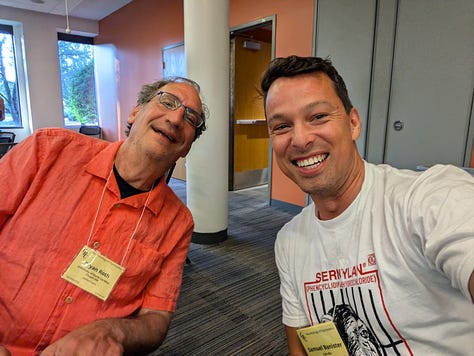
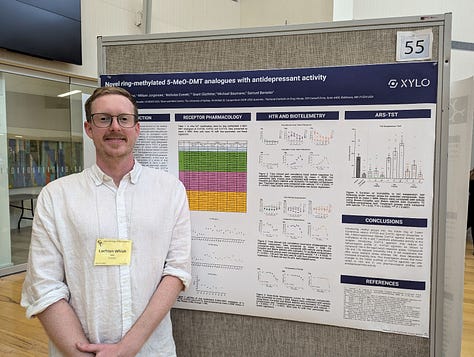

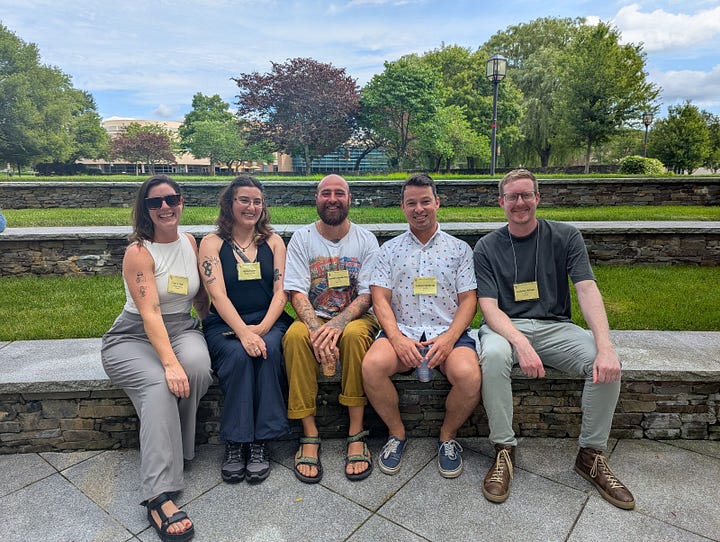
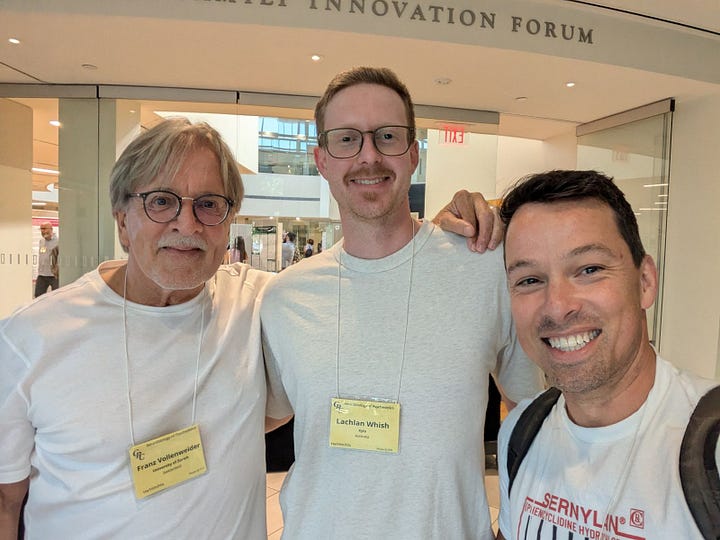
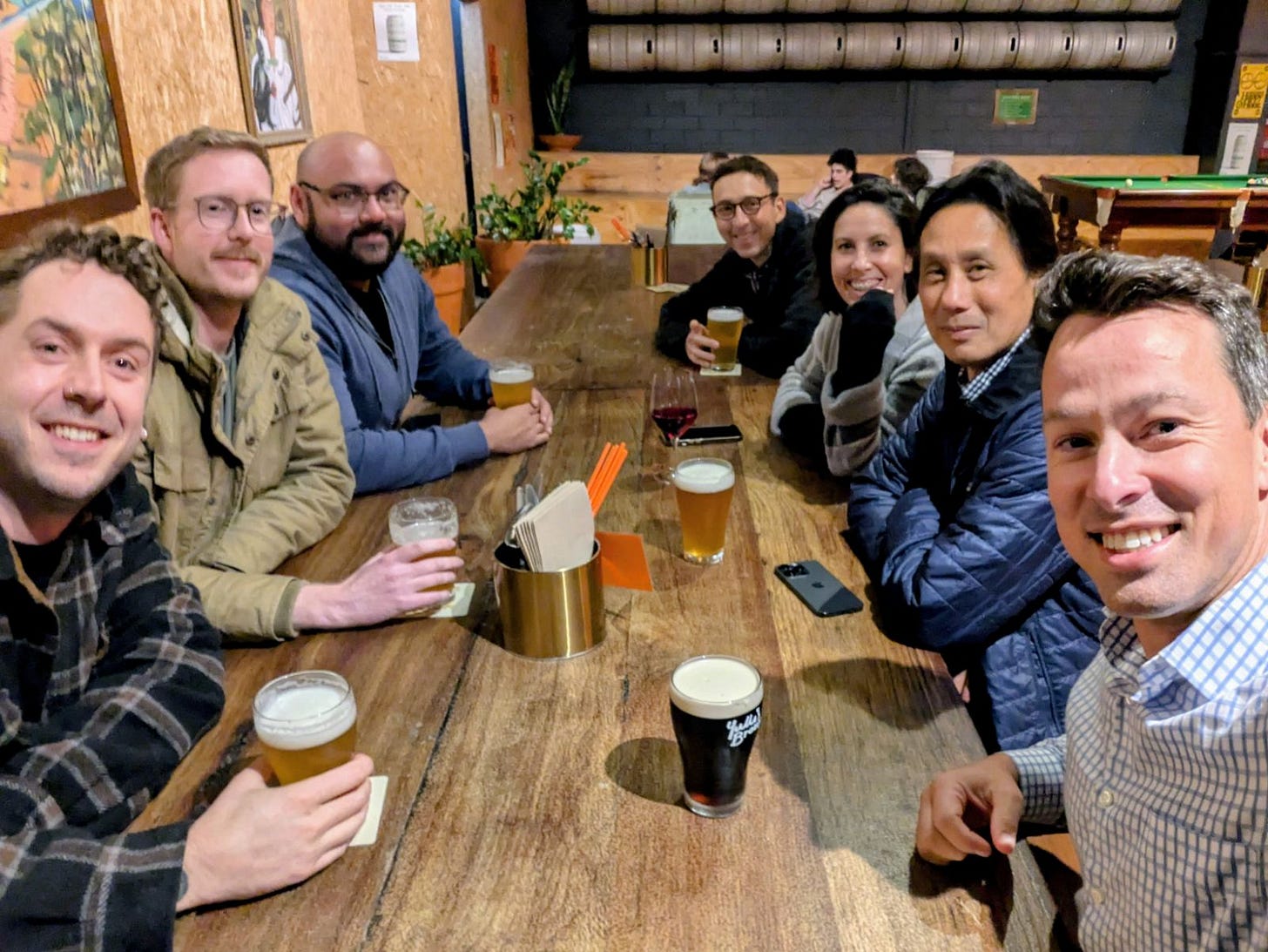
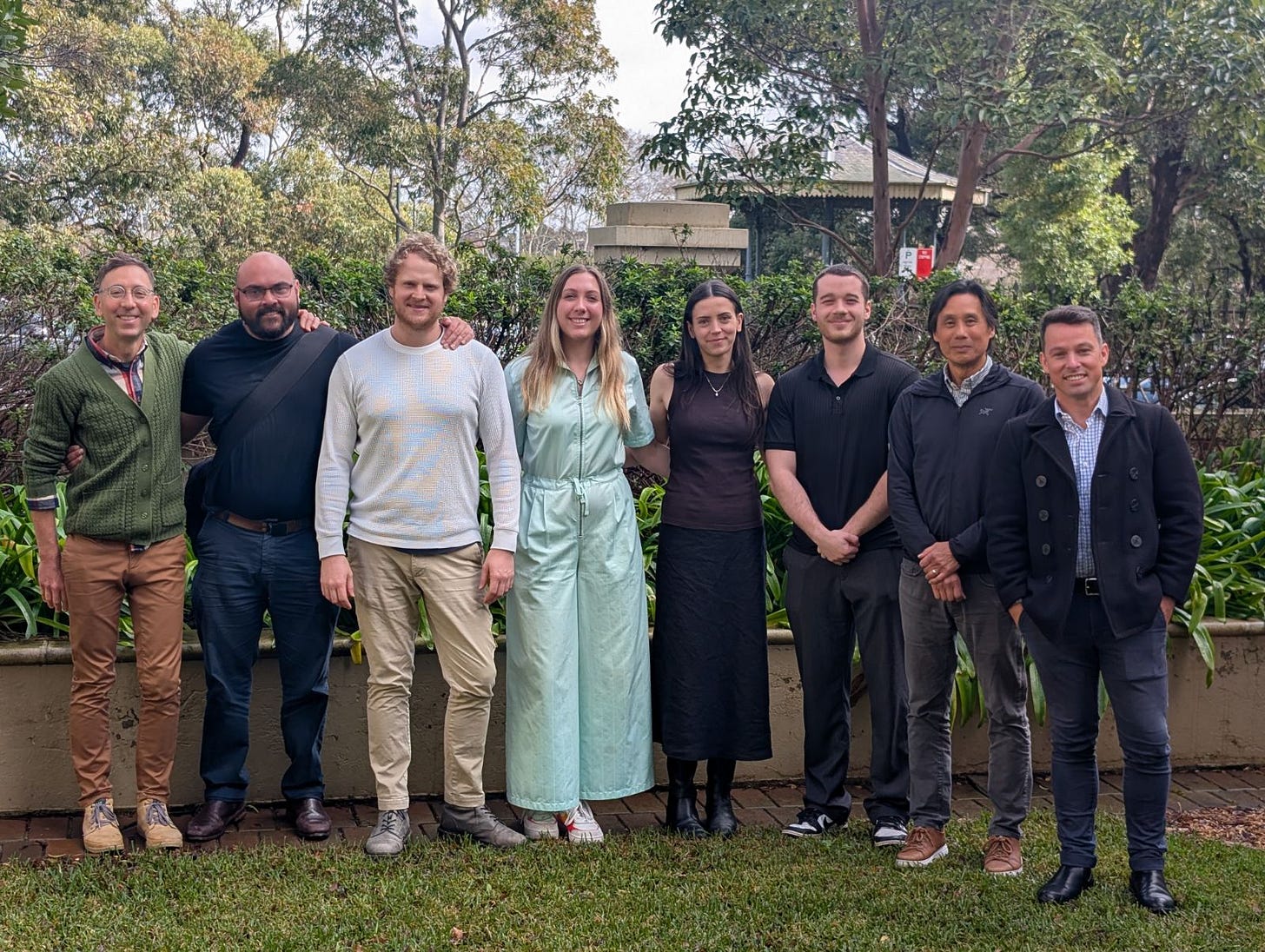
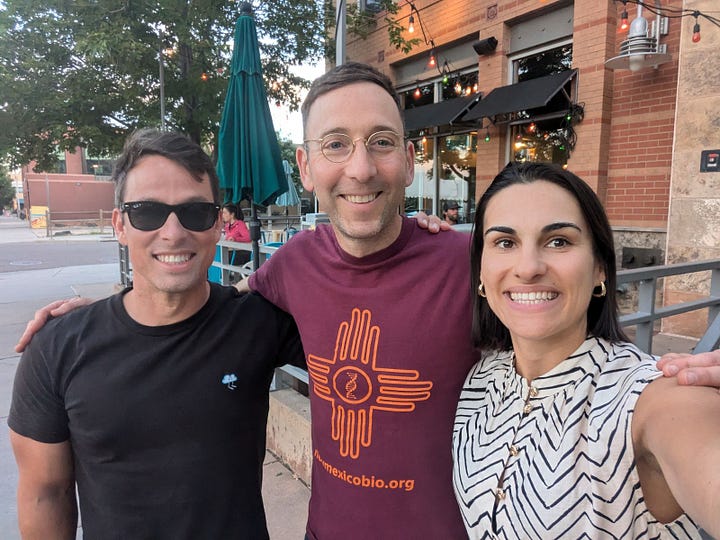
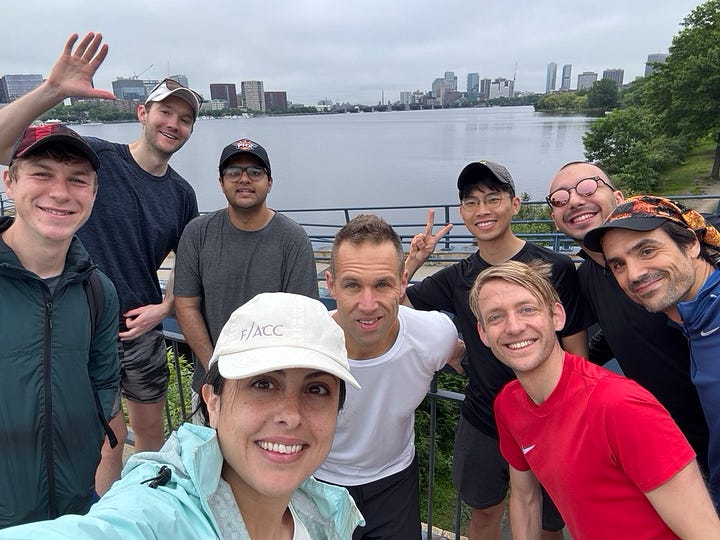
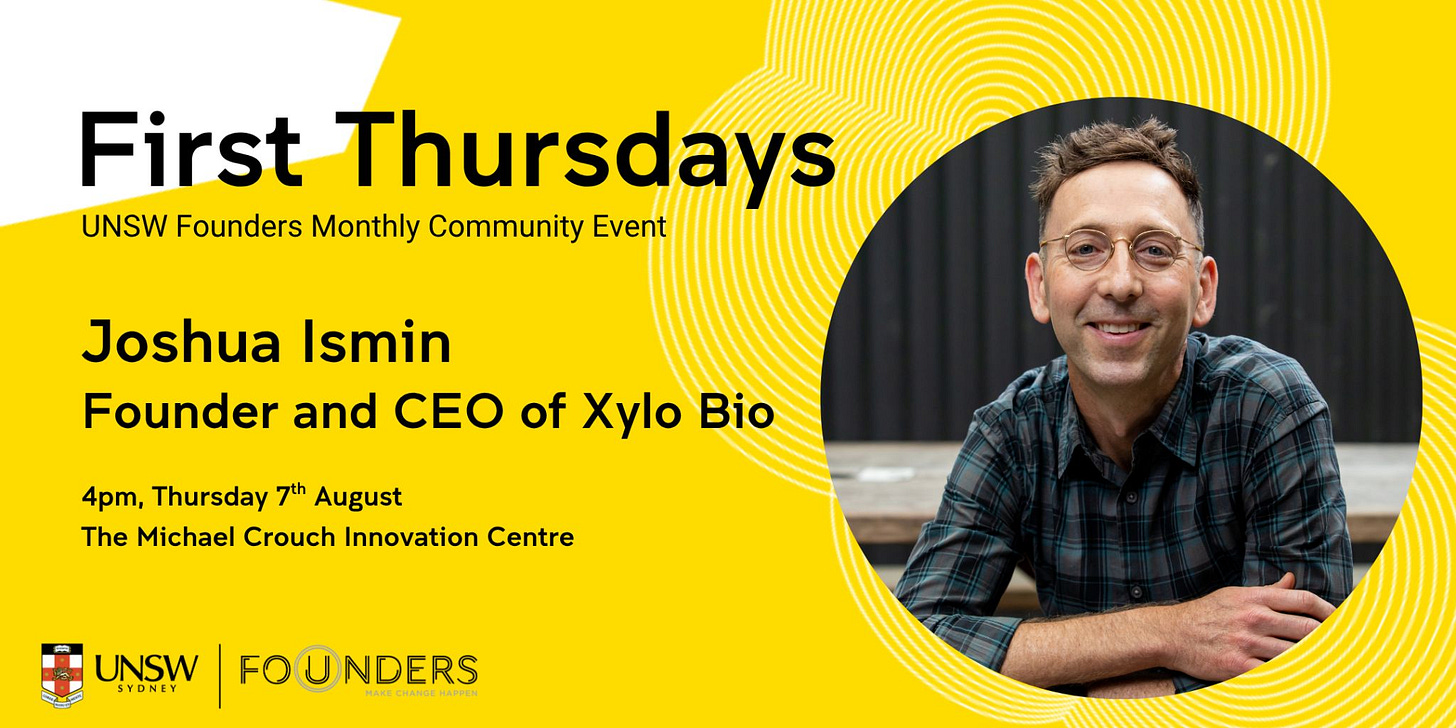
Research Updates
Clinical Research
- Control groups in psilocybin trials | Control group participants in psilocybin trials for depression showed significantly less improvement than those in SSRI or esketamine trials, raising concerns that psilocybin’s efficacy may be overestimated; a meta-analysis of 17 randomized trials. JAMA Netw Open
- Blood biomarkers differ by depression subtype | MDD subtypes showed distinct serum biomarker profiles, including higher cortisol and lower serotonin in melancholic depression, and elevated IL-1β and IL-4 in atypical depression (N=993). J Clin Psychiatry
- First-in-human trial of RE104 | A single subcutaneous doses of RE104 (a prodrug of 4-OH-DiPT) was safe and well-tolerated up to 30 mg, producing dose-dependent psychedelic effects with a shorter duration than psilocybin; phase study in 48 healthy adults. J Clin Psychopharmacol
- MDMA-assisted therapy for depression | MDMA-assisted therapy significantly reduced depressive symptoms and functional impairment in individuals with MDD, with no serious adverse events, in a small open-label trial (N=12). Br J Psychiatry
- Psilocybin for alcohol and depression | Psilocybin-assisted psychotherapy significantly increased abstinence and reduced craving in patients with comorbid alcohol use disorder and depression; a pilot randomized controlled trial (N=30) in a French inpatient setting. Addiction
- Psilocybin reduces OCD symptoms | A single 10 mg dose of psilocybin reduced compulsive symptoms in adults with OCD, with effects lasting up to one week; a single-arm, fixed order in 19 participants with moderate to severe OCD. Compr Psychiatry
- Psilocybin reduces brain blood flow | Psilocybin, but not ketanserin, significantly decreased cerebral blood flow and constricted the internal carotid artery in healthy humans; randomized crossover neuroimaging study (N=28). J Cereb Blood Flow Metab
- Sublingual 5-MeO-DMT microdosing trial | Repeated sublingual microdoses of 5-MeO-DMT were well tolerated and modulated brain activity without inducing full psychedelic effects; a phase 1 study (N=10 per group). Neuropsychopharmacology
- Clinician attitudes toward psychedelic therapy in Australia | Most Australian mental healthcare providers expressed support for psychedelic-assisted psychotherapy, though psychiatrists remained more cautious about safety and scientific rigor; a cross-sectional survey (N=109). Aust N Z J Psychiatry
- Psychedelic use and depressive symptoms | Non-clinical psychedelic use was modestly associated with increased depressive symptoms, with challenging experiences medisting this relationship; a large longitudinal cohort study (N=12,345 at follow-up). J Affect Disord
- Psychedelic use among people with eating disorders | Nearly one-third of survey respondents with eating disorders reported lifetime psychedelic use, with most describing infrequent use and perceived benefits for symptoms and overall mental health; a cross-sectional survey (N = 5,247). J Eat Disord
- Participant diversity in psychedelic trials | Most participants in psilocybin and LSD trials were White, with significant underrepresentation of Black and Asian individuals, raising concerns about generalizability; a cross-sectional analysis of 9 interventional trials (N=501 for psilocybin). J Psychopharmacol
- Psilocybin alters gaze during art viewing | High-dose psilocybin altered visual attention by producing more localized and less entropic gaze fixations without changing subjective aesthetic ratings; an eye-tracking study under naturalistic conditions. Sci Rep
- Fatalities linked to DMT and polydrug use | Two deaths in the UK were associated with DMT use alongside other serotonergic substances, potentially causing serotonin syndrome; a case report and literature review. J Anal Toxicol
Preclinical Research
- The polypharmacology of psychedelics | Psychedelics exhibited potent activity across 318 GPCRs and several kinase targets, including serotonin, dopamine, and adrenergic receptors; and activated multiple 5-HT2A signaling pathways, highlighting complex polypharmacology. Neuron
- 5-HT2C limits MDMA’s rewarding effects | MDMA’s serotonin release constrained its dopamine-driven rewarding effects through 5-HT2C receptors in the nucleus accumbens, reducing abuse potential while preserving prosocial properties. Mol Psychiatry
- Serotonin pathway relieves pain-linked depression | Activation of the DRN–VLO serotonergic pathway reduced depressive-like behaviors in a trigeminal neuralgia mouse model of neuropathic pain, via 5-HT1A and 5-HT2A receptor mechanisms. J Headache Pain
- Photoswitchable 5-HT2A ligand favors β-arrestin | A novel tryptamine-based, light-activated ligand showed nanomolar affinity for 5-HT2A receptors and preferentially recruited β-arrestin2 over Gq, offering a tool to dissect psychedelic signaling pathways. J Med Chem
- Psychedelics disrupt monoamine brain connectivity | Both a 5-HT2A agonist (TCB-2) and antagonist (MDL-100,907) disrupted coherent monoamine signaling across 28 brain regions during forced exploratory behavior in male mice, with TCB-2 inducing dose-dependent changes that were partly reversed by the antagonist. Prog Neuropsychopharmacol Biol Psychiatry
- LSD’s antidepressant effects involve 5-HT2B | LSD’s rapid antidepressant and anxiolytic effects in rats were dependent on 5-HT2B receptor activation and absent in mice, highlighting species differences. Biomed Pharmacother
- Psilocybin improves lifespan in aged mice | Psilocin extended cellular lifespan and psilocybin increased survival in aged mice, suggesting potential geroprotective effects. NPJ Aging
- Repetitive blast lowers 5-HT2A in rat cortex | Repetitive low-level blast exposure chronically reduced 5-HT2A receptor expression in the anterior cortex of male rats. A preclinical study examining 5-HT2A levels across brain regions at 7 timepoints up to 12 months post-injury. Front Neurol
- Automated HTR detection using DeepLabCut | An accurate, low-cost, and open-source method to quantify psychedelic-induced head twitch response in mice using DeepLabCut and a simple behavioral analysis script was developed and validated. ACS Chem Neurosci
- Psilocybin effects on cardiac serotonin receptors | Psilocybin and psilocin increased contractility and phospholamban phosphorylation in isolated perfused hearts from mice overexpressing human 5-HT4 receptors, suggesting serotonergic cardiac activity. Pharmaceuticals (Basel)
- Psilocin causes visual distortions in rats and humans | Psilocin impaired the ability to distinguish static from dynamic visual stimuli in both humans and rats, providing the first evidence that rats experience visual distortions similar to those reported by humans. Biol Psychiatry Glob Open Sci
- Psilocybin does not enhance visual attention | Psilocybin, TCB-2, and M100907 impaired performance in the continuous performance task in mice, likely due to locomotor effects rather than attentional disruption. Psychopharmacology (Berl)
- 5-HT2C receptors important for head twitch | 5-HT2C activation contributed to psychedelic-like head twitch responses in male mice, alongside 5-HT2A activation, and was associated with neuroinflammatory effects at high doses. Psychopharmacology (Berl)
- Microdosing LSD for dog anxiety | Microdosing 1cp-LSD was associated with reduced anxiety symptoms in a dog with severe separation anxiety; a one-month single-case pilot study. Vet Med Sci
- [Preprint] Psilocybin does not relieve pain in mice | Psilocybin had no analgesic effects in mouse models of acute, inflammatory, neuropathic, or musculoskeletal pain. A preclinical study using multiple pain assays and psilocybin doses in mice. bioRxiv
- [Preprint] LSD reverses morphine-induced brain changes | Repeated LSD dosing disrupted morphine-induced place preference, restored synaptic plasticity in VTA GABA neurons, and altered DNA methylation in morphine-treated mice. bioRxiv
- [Preprint] 5-HT2A agonist amplifies 5-Hz brain waves | A psychedelic 5-HT2A agonist increased spontaneous and evoked 5-Hz oscillations in the visual and retrosplenial cortex of awake mice, suggesting enhanced top-down modulation of perception. bioRxiv
Reviews and Editorials
- The therapeutic potential of psilocybin beyond psychedelia through shared mechanisms with ketamine | This review compares the molecular and circuit-level mechanisms of psilocybin and ketamine, highlighting their shared engagement of BDNF-TrkB signaling and neuroplasticity pathways, and explores the potential for non-hallucinogenic, rapid-acting antidepressant development. Mol Psychiatry
- Are we hallucinating or can psychedelic drugs modulate the immune system to control inflammation? | This review explores growing evidence that psychedelics, particularly 5-HT2A agonists, can reduce inflammation by modulating immune responses – highlighting the potential for both hallucinogenic and non-hallucinogenic compounds to treat psychiatric and inflammatory disorders. Br J Pharmacol
- Psychedelics target neuroimmune interactions to limit fear | This research highlight summarizes a study showing that psilocybin and MDMA reduce fear behavior by disrupting stress-induced neuroimmune signaling between meningeal immune cells, astrocytes, and neurons – revealing a novel mechanism of psychedelic action beyond the brain. Cell Res
- The changing landscape of medicinal chemistry optimization | This perspective reviews how medicinal chemistry strategies have evolved over the past two decades, revealing shifts in molecular properties and optimization practices that reflect changing priorities in small-molecule drug discovery. Nat Rev Drug Discov
- Psychedelics for alcohol use disorder: A narrative review with candidate mechanisms of action | This review synthesizes decades of research on psychedelics for alcohol use disorder, highlighting mixed clinical findings and proposing biopsychosocial mechanisms, ranging from neuroplasticity to social connection, that may underlie their therapeutic effects. CNS Drugs
- Examining the potential of psilocybin and 5-MeO-DMT as therapeutics for traumatic brain injury | This review explores how psilocybin and 5-MeO-DMT may alleviate cognitive, affective, and neuroinflammatory consequences of traumatic brain injury through distinct yet overlapping neuroplastic, anti-inflammatory, and neuroprotective mechanisms. Prog Neuropsychopharmacol Biol Psychiatry
- Psychedelic drugs for the treatment of substance use disorders | This editorial reviews the current evidence and future directions for using psychedelics, particularly psilocybin and ketamine, as novel treatments for substance use disorders, highlighting their therapeutic promise alongside key challenges in trial design, regulation, and accessibility. Expert Rev Clin Pharmacol
- Psilocybin in the treatment of eating disorders: a systematic review of the literature and registered clinical trials | This systematic review found limited but promising early evidence that psilocybin may be safe and well-tolerated in anorexia nervosa, highlighting the need for larger trials to assess its therapeutic potential in eating disorders. Eat Weight Disord
- Females in psychedelic research: A perspective for advancing research and practice | This perspective highlights the critical need to account for hormonal fluctuations in women when designing and interpreting psychedelic research, arguing that menstrual cycle tracking and hormone-informed protocols can improve scientific validity and patient safety. ACS Pharmacol Transl Sci
- Narrating the psychoneuroimmunomodulatory properties of serotonin 5-HT2A receptor psychedelics from a transdiagnostic perspective | This narrative review synthesizes evidence on how 5-HT2A receptor psychedelics modulate immune and neuroendocrine pathways, highlighting their potential role in treating diverse neuropsychiatric disorders via psychoneuroimmunological mechanisms. Acta Neuropsychiatr
New Clinical Trial Registrations
- Psilocybin (25 mg vs 12.5 mg + 12.5 mg 2 hours apart) | Stroke (N=20) | Psychedelic Healing: Adjunct Therapy Harnessing Opened Malleability (Open Label) | Sponsor: Johns Hopkins University | NCT07053917
- Psilocybin (25 mg) + PEARL therapy | Caregiver Distress (N=15) | Psilocybin-assisted Existential, Attachment and Relational (PEARL) Therapy for Caregivers of Patients With Advanced Cancer: A Phase II Open-Label Trial (Open Label) | Sponsor: University Health Network, Toronto | NCT07048743
- Psilocybin (2–3 mg vs placebo) | Psychological Distress in Palliative Care (N=120) | PSilocybin Microdose for psYCHological and Existential Distress in PALliative Care (PSYCHED-PAL): A Multi-site Phase 3 Double-blind, Placebo-controlled, Parallel-arm Clinical Trial | Sponsor: Bruyère Health Research Institute | NCT07063862
- Psilocybin (25 mg vs 10 mg vs 1 mg) + psychotherapy | Adjustment Disorder due to Cancer (N=87) | A Phase 2b Double-blind, Randomized, Low-dose Comparator-controlled Clinical Trial to Assess the Efficacy and Safety of PEX010 in Psilocybin-assisted Psychotherapy for the Treatment of Adjustment Disorder Associated With Cancer | Sponsor: Psyence Australia Pty Ltd | NCT07072728
- LSD (13 µg) vs Placebo | Healthy Volunteers (N=48) | Drug Effects on Mood and Behavior – Expectancy | Sponsor: University of Chicago | NCT07061886
- Psilocybin (MLS101) vs Placebo | Healthy Volunteers (N=20) | A Phase 1 Translational Study to Assess Brain Activity Using Functional Magnetic Resonance Imaging (fMRI) and to Evaluate the Safety, Tolerability, and Pharmacokinetics of Multiple Doses of MLS101 (Psilocybin) in Healthy Volunteers | Sponsor: MycoMedica Life Sciences PBC | NCT07050368
- Psilocybin (15 mg and 25 mg) + D-Serine | Healthy Volunteers (N=10) | Safety and Psychological Effects of Psilocybin and D-Serine Formulation in Healthy Volunteers (Open Label) | Sponsor: Hadassah Medical Organization | NCT07079930

.webp)